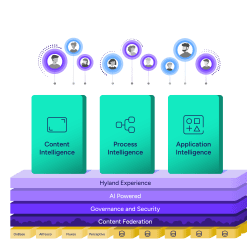Kwik Trip
Store chain uses Hyland to manage HR files for more than 21,000 employees in 800+ locations.

Harness the power of a unified content, process and application intelligence platform to unlock the value of enterprise content.
Learn more
Explore Hyland’s solutions by industry, department or the service you need.
Overview of solutionsIt's your unique digital evolution … but you don't have to face it alone. We understand the landscape of your industry and the unique needs of the people you serve.
 Overview of industries
Overview of industries
Countless teams and departments have transformed the way they work in accounting, HR, legal and more with Hyland solutions.
 Overview of departments
Overview of departments
We are committed to helping you maximize your technology investment so you can best serve your customers.
 Overview of services
Overview of services

Discover why Hyland is trusted by thousands of organizations worldwide.
Hear from our customers
Our exclusive partner programs combine our strengths with yours to create better experiences through content services.
Overview of partners
Find resources to power your organization's digital transformation.
Browse the resource center
Hyland connects your content and systems so you can forge stronger connections with the people who matter most.
Learn about HylandWith our modern, open and cloud-native platforms, you can build strong connections and keep evolving.
 Dig deeper
Dig deeper
Reading time minutes
Store chain uses Hyland to manage HR files for more than 21,000 employees in 800+ locations.

Kwik Trip is a family owned business with 640 retail locations in Minnesota, Iowa and Wisconsin. With their own dairy, bakery and transportation divisions, the company offers fresh food, as well as fuel, in a convenience store setting.
Tasked with managing processes and files for 21,000 employees, Kwik Trip’s centralized, shared service human resources (HR) department is a busy place.
Prior to implementing Hyland's OnBase platform, the department was struggling with paper files that were difficult to keep track of and took up too much office space. Cumbersome processes and an underperforming document retention system made employee file management labor intensive and inefficient.
Related article
The Kwik Trip HR department needed help streamlining its operations. Having already implemented OnBase in their accounts payable (AP) department, the company knew that deploying the solution in HR could improve file management and create greater transparency.
With OnBase, each individual HR employee can now access and view the same information.
“OnBase is the central unit for all sub-functions in HR to have a single view of employee information,” said Sarah Jilk, Kwik Trip’s OnBase administrator. “Previously, these sub-functions were very siloed. Documents could be sitting on somebody’s desk for four days before anyone even knew about it. (OnBase has) given them a lot of visibility into the documents in a better timeframe.”
Additionally, each unit within HR has their own custom search built into OnBase that provides instant access to the specific files they need.
With 98 different document types, HR is the company’s largest document repository. Now that all of those documents have been digitized, the rooms they used to inhabit have been converted into additional workspaces for employees.
Another issue with the company’s previous all-paper HR processes: Documents for new employees were sent by truck mail from the various stores, which meant receiving the documents took longer than necessary, and deliveries could be thwarted by adverse weather conditions.
Then Kwik Trip rolled out a store scanning system.
“All of the stores have a scanner now,” Jilk said, “and we use a sweep process from FTP to bring in documents from the stores into OnBase within five minutes. We have a lot of systems in play, but keeping all of our documents in OnBase gives us an easier way to move forward.”
Employee-initiated requests, like mileage reimbursement and status changes, can now be done using simple, standardized online forms. This not only accelerated processing, but has allowed Kwik Trip’s HR department to eliminate five Microsoft Access databases.
Document retention and file management are two other highly important functions that have improved.
“When we updated our system, we were finally able to do purging effectively,” Jilk said. “Now we can create rules for document retention that allow us to automatically purge documents after their termination date.”
Getting users up to speed with the new functionality of OnBase proved simple with the company’s premium training subscription. Supplied with highly effective training videos, new users “are able to spin up forms and modify processes with no help at all,” Jilk said.
Kwik Trip’s on-premises OnBase solution houses an impressive two million HR documents containing sensitive employee information. With role-based security built into OnBase, different users can have different access to documentation based on their HR function. For example, role-based security is used for garnishment and I-9 documents, allowing access to only four people in the company.
“I have 100% more confidence in the security of information,” Jilk said.
—Sarah Jilk, OnBase Administrator, Kwik Trip
Employees in each area of HR can access documents and view processing status in real-time.
HR can set document retention policies to ensure that information isn’t kept longer than necessary.
Role-based security makes it easy to ensure that only employees with the proper permissions get access to certain documents.